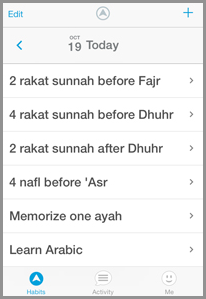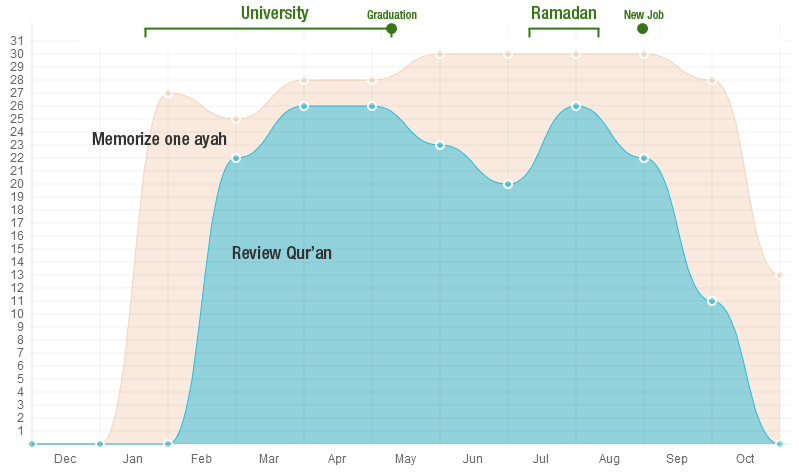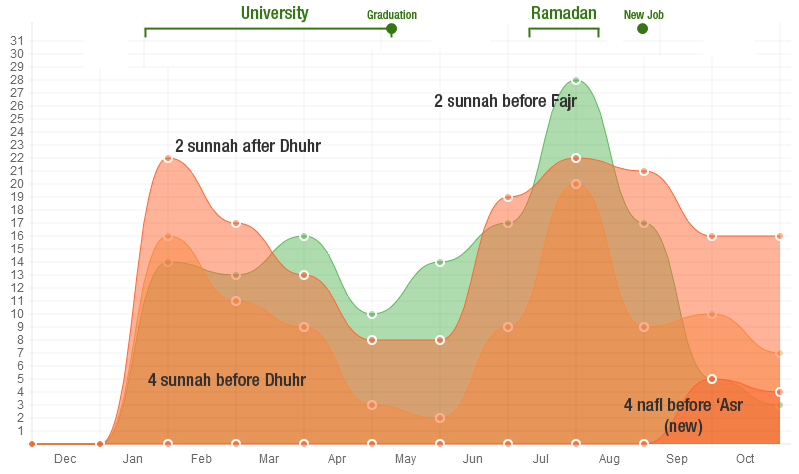By Alex Arrick
“The best actions are those which are small and consistent”
– The Prophet Muhammad ﷺ (peace be upon him) (Bukhari and Muslim)
 The idea of memorizing the entire Qur’an is a goal that usually just sits in the back of our heads. We patiently wait to attack it full-force when the perfect time arises, constantly reassuring ourselves with “insha’Allah (God willing)… one day” type of sentiments. We think that someday we’ll be able to drop everything, quit our jobs, go to the top of an unpronounceable mountain in a country we’ve never heard of and immerse ourselves in the Qur’an as our sole focus. We’ll come back from that mountain being enlightened individuals, no longer anything like our old selves.
The idea of memorizing the entire Qur’an is a goal that usually just sits in the back of our heads. We patiently wait to attack it full-force when the perfect time arises, constantly reassuring ourselves with “insha’Allah (God willing)… one day” type of sentiments. We think that someday we’ll be able to drop everything, quit our jobs, go to the top of an unpronounceable mountain in a country we’ve never heard of and immerse ourselves in the Qur’an as our sole focus. We’ll come back from that mountain being enlightened individuals, no longer anything like our old selves.
Insha’Allah… One day.
I converted to Islam during my last semester of high school in early 2008. I was fascinated by Hamza Yusuf’s stories of studying in the remote desert of Mauritania (a country I had actually never heard of before). And before starting college, I was seriously considering taking donations and going to study overseas. I was going to learn Arabic quickly, live a monk-like life full of spiritual awakenings and come back to the west as a truly enlightened individual.
After coming back into reality, I realized this wasn’t going to happen for a whole host of reasons. I was going to go to college just like any normal kid, live with my parents for a few more years and try to figure out these things in the meantime.
Five years later, I wanted to seriously memorize the Qur’an, without doing anything lucrative or expensive (I didn’t have any money).
At the beginning of 2013, I began to look at methods to memorize Qur’an more efficiently. I looked at all the ayat (verses) I had memorized up to that point and divided the number by the amount of days since I converted (somewhere around 170 ayat and 1,800 days). I discovered that, on average, I had memorized about one ayah every ten days. This was due to very sporadic memorization habits and not keeping up with a daily practice of reading, reflecting and memorizing Qur’an. I knew I could do much more and decided to reevaluate my approach.
I wanted the process of memorizing Qur’an to be more habitual and regular in my life. I discovered, and promptly downloaded a free iPhone application called Lift, which lets you “check-in” to daily habits of your choice. I created the “Memorize one ayah” habit and started logging it each day with the ayah number and when I completed each surah (chapter).
I figured the worst that could happen was I would increase my rate of memorizing Qur’an tenfold.
Shortly after creating the “Memorize one ayah” habit, I started tracking other forms of devotion such as the 12 rakats (units of prayer) of sunnah prayers each day and a few other habits. My home screen on Lift had the following habits:
- 2 rakat sunnah before Fajr
- 4 rakat sunnah before Dhuhr
- 2 rakat sunnah after Dhuhr
- 2 rakat sunnah after Maghrib
- 2 rakat sunnah after Isha
- Salat-ul-Witr
- Make du’a
- Memorize one ayah
- Review Qur’an
This kind of self-tracking is linked to the “Quantified Self” movement, another one of my self-improvement obsessions. People all over the world are using technology to track the number of steps they take each day, their heart rate, what foods their eating and what habits they want to build. Modern technology is allowing people to track these things easily to make changes in their life, and even has immense implications to modern healthcare discoveries with thousands of people uploading their data to the cloud. I decided to take advantage of this approach for purposes of ibadah (worship).
I discovered a lot about my own practices after several months tracking this data. For example: many of the sunnah prayers became automatic after a few months, I became more motivated to pick up the mushaf (written version of the Qur’an) on a daily basis, and was reminded to make du`a’ (supplication) each time I opened up Lift.
Other unexpected results also came after tracking. I started listening to more Qur’an recordings to help my review process, and actually increased my reading speed and reduced my mistakes while reciting off the page.
(Note: Being a convert, I’ve never had a consistent Qur’an teacher. I’m about 95% self-taught when it comes to reading Arabic and reciting.)
To put this in perspective, you would complete the entire Qur’an if you memorized one ayah each day for 17 years. Two ayat each day? Only 8 years. And so on. This was my main motivation. I’m sure that many of those reading this article are hoping to live another 17 years, and memorizing one ayah takes only a few minutes. It’s very accessible and worth the effort.
One of Lift’s top habits is “Floss.” The creator of Lift, Tony Stubblebine, has actually been told that his users are the poster children for the flossing industry. You want to know the trick for starting a flossing habit?
Floss just one tooth.
Getting started is the hardest thing. Stopping whatever you’re doing and flossing that one tooth is the hardest part of the process. Flossing the rest becomes easy. Over time, you get better at it. You begin to almost look forward to it.
This is why the “Memorize one ayah” habit was more than what it seemed. I often memorized more, the hardest part was picking up the mushaf and starting. It was still hard, and I often put it off until the last thing before sleeping. But after that one ayah, I didn’t have to keep going. I had met my quota for the day.
I was most strict regarding the memorizing habit, salat ul-witr, and the 2 sunnah rakats after isha prayer. Here are my 10 months of results with the different habits. The graphs show how many check-ins to each habit I had each month. I marked the top with life events to see correlations to what other things were going on in my life. This has been a busy year!
Qur’an Habits
Evening Sunnah Prayers and Salat ul-Witr
Daytime Sunnah Prayers
You’ll notice that I stopped tracking the evening sunnah prayers after September. This is because they became automatic. I now treat the “memorize one ayah” hand-in-hand with the “Review Qur’an habit,” which I also removed for the sake of minimalism.
The daytime sunnah prayers were much more sporadic than the evening ones. This was probably due to my chaotic schedule during my last semester of university. You can see them slowly become more frequent after May, peaking around Ramadan, and then dropping again as I got a new job and adjusted to a new schedule.
I also decided to add the 4 nafl before ‘Asr habit. I am not as strict about it, but it’s still a good reminder when I see it every day. Building the sunnah prayers as habits is currently a higher priority.
Regarding memorization, I had increased my memorization more than tenfold due to often memorizing 2-3 ayat each day. The worst thing that happened was I would batch several days together and only pick up the mushaf every three days or so. Don’t do this. It will mess your rhythm up badly.
I’m closing in on finishing juz `amma (the 30th section of the Qur’an), which has a lot of shorter ayat. This is something that would have taken me years without starting a daily practice.
Here are some tips on building habits using a tool like Lift:
- Keep your habits simple. Don’t confuse yourself with 30 new habits that will change your life. A simpler habit schedule is easiest to keep up with.
- Check-in immediately after completing the habit. This gives you an immediate sense of reward and keeps you motivated.
- If checking into the “Memorize one ayah” habit, write down the ayah numbers in the app. This will help you keep track of where you left off, and it’s fun to look back.
- Don’t get upset if you miss a day. Start where you left off and renew your intention.
So where do you start? Begin by getting the Lift iPhone app or use their web interface (it’s free). There are probably some other people already participating in the daily habits you want to start. You can even follow me.
Realizing that you don’t need to put off worshipping Allah, keeping your goals in the back of your head, is very liberating. Remember to start something new like this with good intentions and lots of du`a’. You might surprise yourself with the milestones you achieve.
Insha’Allah… Today!
About the author: Alex Arrick is a Muslim convert living in Texas. He has written several articles for VirtualMosque.com including 12 tips for the convert Muslim and 8 things you should understand about converts. You can reach him at alex.arrick@yahoo.com.




Very profound. May Allah reward you for such an advice…I have always wanted to get in the habit of working with Quran, but didn’t exactly know how to start. You have showed me the way. May Allah reward you with the best of His rewards.
Having just downloaded the app on Wednesday to start the new year. Started with just “Drinking more water”. This articles comes in at just the right time. Am adding more Islamic-based habits for tracking purposes (read Quran, memorize, learn Arabicm pray nawafil), and insyaAllah they will become automatic in due time. Thank you for sharing and may He reward you for your efforts and good deeds.
I found that if we miss a day of habit, it can get really hard to go back and continue. Like you said, getting started (or getting started again) is the hardest thing. Jazakallah for this article 🙂
Just what I was looking for. Alhamdulillah! Allah increase you
MashAllah a very well written article with very practical advise. JazakAllah khairan for writing this!
Subhanallah! This is what I have been looking for! Thank you for writing this article. May Allah reward you for you efforts!
you are freakin awesome mA. I loved this article
MashaAllah, very good article. The hardest thing for me at the moment is memorising without a teacher. Hopefully this method will help overcome it.
May Allah bless you, brother! Hopefully i’m gonna try and start today… Jazakallah khairan for the motivation.
Thanks for the motivation brother.
May Allah be pleased with all your efforts. ameen
[…] Building Habits as Worship: A Year Spent Quantifying Devotion by Alex Arrick (Guest Author) […]